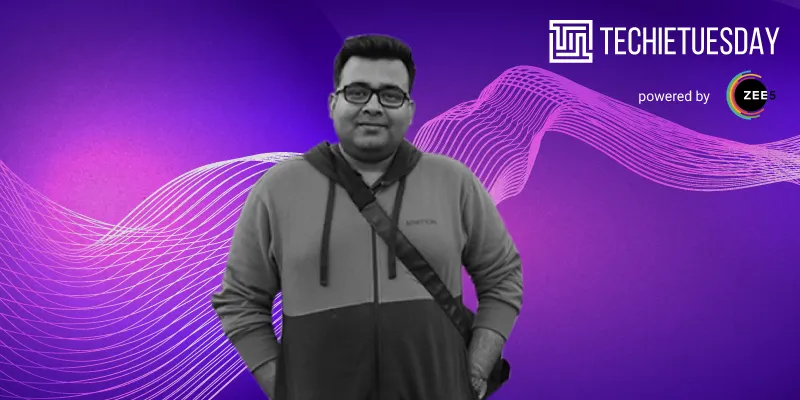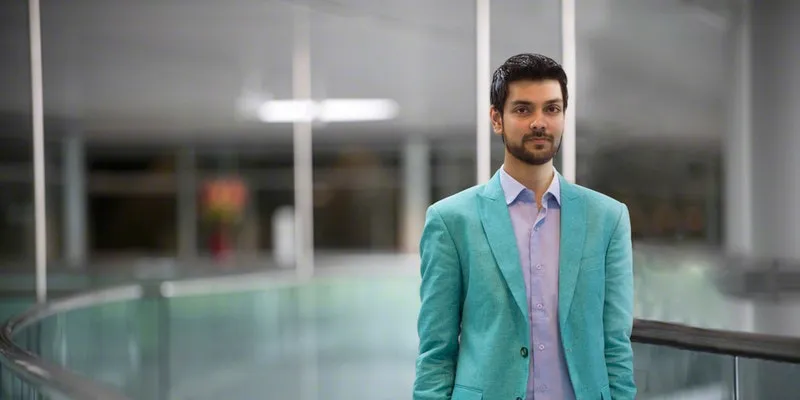[WATCH] The week that was - from Zomato’s acquisition of Uber Eats to Deepinder Goyal's favourite food delivery app
This week, we bring you inspirational stories of founders and their journeys. From Deepinder Goyal, whose foodtech biggie Zomato recently took over Uber Eats, to Sudipta Banerjee, the techie from a Bengal village who went on to build Wynk Music, there’s motivation for everyone.
The fact that the growth of the foodtech industry has changed the way Indians eat is old news. But when an Indian foodtech unicorn acquires a business division of a global unicorn, it’s breaking news.
Gurugram-based foodtech startup Zomato recently acquired Uber Eats, the Indian food delivery division of Uber. The San Francisco-based ride-hailing giant decided to sell the entity off to Zomato as the India food business did not contribute significantly to its global business.

An Uber Eats delivery executive in Mumbai, India
This move was one of Uber’s steps towards cutting its losses, but it marked the first big step towards a consolidation for the Indian foodtech market. For despite the fact that the two big players, Zomato and Swiggy, dominate the space, Uber Eats still held a strong 12 percent of the market.
What does Zomato gain from this deal?. The startup gets Uber’s delivery partners and Uber Eat’s business details, including customer information, delivery partners, and order history. The Uber app will redirect users to Zomato for the next six months whenever they choose the option of “get food delivered”, which translates into a part of the market share.
But what does Zomato’s acquisition of UberEats mean for India’s foodtech ecosystem? Analysts say the strength of Uber Eats’ delivery network will help Zomato grow its market share, and compete more fiercely with Swiggy nationwide.
Watch our video on the top stories of the week:
Moving on from UberEats, we turn our focus to an entrepreneur who left his lucrative job to take forward his family's 150-year-old legacy in Ayurveda.
At an early age, Arjun Vaidya suffered from severe juvenile bronchitis. He was cured after 14 years of meticulous Ayurvedic treatment.
In an interaction with SMBStory, he says, “My grandfather had an Ayurvedic clinic where he used to attend to 350 patients on a daily basis. He took forward the 150-year-old Ayurvedic legacy of our ancestors and he also wanted me to get into Ayurveda.” His grandfather advised him to study biotech, which would help him in the business.
Arjun did his bachelor’s in international relations and economics from Brown University, and started his career with L Capital Asia (the private equity arm of the Louis Vuitton Moet Hennessy Group) in the US where he worked for a couple of years. In 2013, he headed back to India. Unfortunately, his grandfather passed away.
In October 2016, Arjun decided to quit his job and founded Dr Vaidya.
Inspiration is everywhere - within the family and outside, and this is what inspired Sudipta Banerjee, the techie from a Bengal village who went on to build Wynk Music.
Sudpita strongly believes that “software is only a tool or an enabler. Artificial intelligence is only a tool or an enabler. The larger picture is something else: solving consumer problems is more important”.
Sudipta, now CTO of Wynk Music and Airtel Xstream, shares how his tech journey started at NIT Warangal, continued at HCL, Verizon India, and Yahoo where he acquired crucial learnings and tools, and took him to Airtel where he built Wynk Music.

Sudipta
Returning to the flavour of the week: foodtech. And no, this time we aren’t talking about the two biggies: Swiggy and Zomato.
It isn’t uncommon for lunch meetings at offices across India to host a colourful display of takeout boxes, thanks to the ease that foodtech startups offer. It may be easy to order when you are caught up with deadlines and in endless meetings, but not all options are healthy.
It was to address this concern that France-based B2B food catering tech company Elior Group started operations in India in 2017. The company has built ‘corporate restaurants’ that focus on providing healthy and sustainable meals.
“When we say sustainable meals, we not only mean healthy meals, but also how the raw materials are procured. The question to be asked is whether they been procured in the right and sustainable way,” Philippe Guillemot, CEO, Elior Group, says.
The Indian startup ecosystem is eagerly waiting for Union Finance Minister Nirmala Sitharaman’s Budget speech on February 1, with the hope that there would be measures that facilitate ease of doing business in the country, while solving some knotty tax issues around ESOPs, LTCG, and GST.
The startups in the country have been on an upward curve, but the larger concern surrounds issues like crunch in the working capital and the easy flow of investor money into the ecosystem.
“This is a highly anticipated budget as startups are hoping that the government will unveil certain measures which will further improve the ease of doing business, especially when there is a genuine crisis around working capital,” says Siddarth Pai, Founding Partner and CFO, 3one4 Capital.
Many startups today are struggling to raise money to meet their day-to-day working capital requirements. Further, banks are unwilling to lend, and startups have to also bear the brunt of the goods and services tax (GST), as they have to pay the amount before they even realise their revenue.
“Startups are facing a cash- flow problem where they have to deposit GST based on their invoices rather than revenue receipts. Hopefully, this time, the Budget will provide a solution,” says Sachin Taparia, Founder, LocalCircles.
The India story continues to excite despite the slowdown. With a growing number of users across Tier II and Tier III India consuming content and shopping online, brands, startups, and content platforms are tying up to create a win-win situation.
The years 2018 and 2019 saw the birth of several Indian language content apps. That, and the growing penetration of internet, brought home the fact that there was a new audience base looking to consume content in preferred languages.
According to YourStory Research data, between 2015 and 2019, over $610.88 million was pumped into Indian language content apps, across 49 deals. A bulk of this funding was in 2018 and 2019. While 2018 saw around $270.90 million investment across 18 deals, around $247.06 million was pumped in across eight deals till October 2019.
All these Indian language content apps are targeting new internet users. With over 530 million internet users, India has the second largest internet user base in the world today.
And as we wrap up this week’s top stories, let’s return to food.
Do you know what’s common between Hike Founder Kavin Bharti Mittal, Zomato Founders Deepinder Goyal and Pankaj Chaddha, Chaayos Founder Nitin Saluja, cricketer Virat Kohli’s brother Vikas Kohli, YouTuber Kusha Kapila, Singer Aastha Gill, and UrbanClap Founder Abhiraj Bhal?
It's the place they order food from: Delhi-based cloud kitchen startup Caterspoint. Launched in October 2016 by a young chef Anshu Raj (now 26), Caterspoint is a cloud kitchen that delivers nutritious, innovative, low-calorie, and tasty food to its customers.

Anshu Raj, Founder and Director, Caterspoint
“We are inspired by the popular brand Domino’s for the convenience and consistency in the delivery model, but in a little more to the healthy side and daily habits. It has helped clients to have convenient, fresh, and healthy food at any given point of time, on-demand,” says Anshu Raj, Founder and Director, Caterspoint.
The Caterspoint menu covers about 260 items, including breakfast, lunch, snacks, dinner, desserts, refreshing beverages, and options like porridge, oatmeal, a variety of salads, and sandwiches.
(Edited by Teja Lele Desai)


![[WATCH] The week that was - from Zomato’s acquisition of Uber Eats to Deepinder Goyal's favourite food delivery app](https://images.yourstory.com/cs/2/eab8e5802d6a11e9aa979329348d4c3e/Imageu7y2-1579929966459.jpg?mode=crop&crop=faces&ar=2%3A1&format=auto&w=1920&q=75)
![[WATCH] The week that was - from an interview with Accel India co-founders to Infosys’ Narayana Murthy’s take on startups, entrepreneurship, and more](https://images.yourstory.com/cs/2/b3bfb136ab5e11e88691f70342131e20/Weekend-Wrap800x400-1579324681292.png?fm=png&auto=format&h=100&w=100&crop=entropy&fit=crop)




